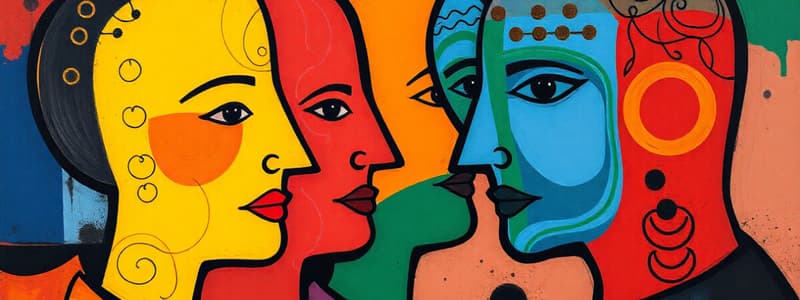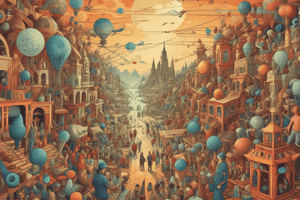Podcast
Questions and Answers
Which concept, popularized by C. Wright Mills, encourages individuals to analyze their personal problems as part of broader social issues?
Which concept, popularized by C. Wright Mills, encourages individuals to analyze their personal problems as part of broader social issues?
- The Sociological Imagination (correct)
- Symbolic Interactionism
- Conflict Theory
- Functionalism
How do Durkheim's, Weber's, and Marx's perspectives differ on the primary drivers of social change?
How do Durkheim's, Weber's, and Marx's perspectives differ on the primary drivers of social change?
- Durkheim emphasizes class conflict, Weber focuses on bureaucracy, and Marx highlights social integration.
- Durkheim focuses on social solidarity, Weber emphasizes rationalization and ideas, and Marx highlights economic factors. (correct)
- Durkheim highlights rationalization, Weber emphasizes social solidarity, and Marx focuses on cultural values.
- Durkheim emphasizes economic factors, Weber focuses on social solidarity, and Marx highlights the role of ideas.
Which sociological perspective is most likely to examine how individuals create and interpret meaning through daily interactions, influencing their understanding of the social world?
Which sociological perspective is most likely to examine how individuals create and interpret meaning through daily interactions, influencing their understanding of the social world?
- Feminist Theory
- Symbolic Interactionism (correct)
- Functionalism
- Conflict Theory
What is a key distinction between 'hard' and 'soft' sciences in terms of research methodologies?
What is a key distinction between 'hard' and 'soft' sciences in terms of research methodologies?
How does the concept of a 'paradigm shift,' as described by Thomas Kuhn, relate to changes in scientific thought?
How does the concept of a 'paradigm shift,' as described by Thomas Kuhn, relate to changes in scientific thought?
Which of the following is a key characteristic that distinguishes the Modern era from the Postmodern era?
Which of the following is a key characteristic that distinguishes the Modern era from the Postmodern era?
Considering the historical context of the Modern period, which of the following events significantly shaped sociological thought?
Considering the historical context of the Modern period, which of the following events significantly shaped sociological thought?
How could an understanding of 'Orientalism' help sociologists critically analyze cultural representations?
How could an understanding of 'Orientalism' help sociologists critically analyze cultural representations?
How does ethnocentrism potentially impact sociological research?
How does ethnocentrism potentially impact sociological research?
Which of the following scenarios demonstrates the application of conflict theory to understanding social inequality?
Which of the following scenarios demonstrates the application of conflict theory to understanding social inequality?
Flashcards
Sociological Imagination
Sociological Imagination
The ability to see the relationship between individual experiences and the larger society.
Durkheim's key concept
Durkheim's key concept
Social solidarity arises from shared activities and societal bonds.
Weber's key concept
Weber's key concept
Rationalization and bureaucracy are central to understanding modern society.
Marx's key concept
Marx's key concept
Signup and view all the flashcards
Paradigm
Paradigm
Signup and view all the flashcards
Soft Sciences
Soft Sciences
Signup and view all the flashcards
Hard Sciences
Hard Sciences
Signup and view all the flashcards
Modern Era
Modern Era
Signup and view all the flashcards
Postmodern Era
Postmodern Era
Signup and view all the flashcards
Orientalism
Orientalism
Signup and view all the flashcards
Study Notes
- The Sociological Imagination, Thinking Critically, and the Invitation to Sociology: Know the authors and main concepts.
- Study the basic concepts of Durkheim, Weber, and Marx.
- Understand the basic tenants of functionalism, conflict theory, feminism, and symbolic interactionism.
- Grasp the concept of a paradigm and its elements.
- Know the differences between "soft" and "hard" sciences.
- Recognize the differences between the Modern and Postmodern eras.
- Know important events and developments in the Modern Period.
- Remember the basic components of Orientalism and how it relates to culture and ethnocentrism.
Studying That Suits You
Use AI to generate personalized quizzes and flashcards to suit your learning preferences.
Related Documents
Description
Explore foundational sociological concepts including the sociological imagination, critical thinking, and classical sociological theories from Durkheim, Weber, and Marx. Understand major theoretical perspectives such as functionalism, conflict theory, feminism, and symbolic interactionism. Differentiate between Modern and Postmodern eras and analyze Orientalism's impact on culture and ethnocentrism.




